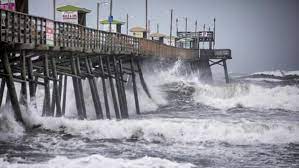The Japan Times emails us cheerfully about “How simple steps can help alleviate climate anxiety/ From gardening to flood-proofing your home, experts say there are simple ways you can ease some of your concern.” And obviously when experts say, bid care adieu. In this case the cure for anxiety about climate change is… to start a small garden. We’re all in favour of gardens. But if you think a gesture that small will fix climate change you must think it’s a very small problem to begin with, in which case perhaps your anxiety was misplaced.
According to the actual story, a small parcel of land near Osaka’s “bustling Namba district” has been cleared of “bright billboards and rowdy pubs” and filled with ‘lemongrass, peppers and fennel” in:
“Minnanouen Kitakagaya, a community garden that allows people living in the densely packed metropolis to rent small plots of land and grow just about whatever they like.”
And so far we’re right with them. We’ve never loved bright billboards and have outgrown rowdy pubs. We like gardening.
On the other hand, we feel that it’s one of those news stories that isn’t really news, given that:
“Gardens of this type are not uncommon in Japan’s large urban centers, where most people live in condominiums, apartments or homes with little or no space for a garden.”
So Japanese turn to microgardens, in a continuation of Japan’s long tradition of microgardens. Start the presses. But let us not be too cynical. At least not yet.
Even in Canada’s large urban centres, a small garden can be an oasis of peace and nature-based serenity. And we dream of having one of those self-misting orbs where you grow herbs in your kitchen and pick them fresh for the home-made salads and other dishes we um well in theory often make. But soft. Or rather hard, because here’s the kicker:
“as climate change roils food supply chains, these kinds of spaces may become crucial, not only for the role they can play in teaching people how to improve their own food security, but also for mitigating something that’s rising in step with the mercury: climate anxiety.”
The point being not that climate change is actually roiling supply chains. Rather, the same journalists who wrongly convinced people that they are starving as the world witnesses record harvests and much of it is in the grips of an obesity crisis now want you to think growing fennel will fix the issue. (By the way, we went to look up fennel and found an enthusiastic article but as it started “Everyone goes crazy for kale” we decided we didn’t believe anything else it said, including that “this funky-looking veggie might be intimidating from the outside, but… [o]nce you know how to approach it, it’s easy to work with.” Though it is apparently related to the carrot and tastes like anise which tastes sort of like licorice which is obviously disgusting.)
Now if you’re looking to sautée up a mess of clichés, this piece will appeal to you:
“Amid floods, wildfires, droughts and heat waves exacerbated and made more frequent by a warming planet, anxiety spurred by climate change is rising in many parts of the world.”
Or maybe it’s all the careless alarmism that’s behind the anxiety. Which apparently is a thing even in wealthy societies where the trivial effects of warming are easily coped with, but the enervating effects of prosperity are not:
“Notably, that includes people living in rich nations in addition to citizens of developing countries, which are generally expected to bear the brunt of climate change.”
The article even has a Canadian angle, quoting “Andrew Weaver, a Canadian climate scientist at the University of Victoria whose academic career bookends a stint in provincial politics from 2013 to 2020” that:
“Prior to getting elected, climate change was always an esoteric problem, in the view of my students, that was going to affect someone else, somewhere else in the world, somewhere in the future. And when I came back (in 2021), I literally was scraping people off the floor in terms of the ... sense of despondency and despair about climate change.”
Literally scraping people off the floor. Though if those unfortunate students are looking to the perennially alarmist Andrew Weaver to cheer them up, back down they go. And the blame, according to an article Weaver coauthored recently in Nature Climate Change, is none other than the 1.5C target itself:
“Due in particular to traditional and social media reframing, the aspirational 1.5 (degrees Celsius) global warming threshold — a goal that physical, socioeconomic and infrastructure constraints have now rendered unlikely — is transmuting from a driver of change to an instigator of anxiety”.
Oh dear. We told everyone the world was going to end at 1.5C and now that we’re nearly there they are scared the world might end. But don’t worry, there’s a simple fix. Apparently amid surging climate panic in 17 advanced economies:
“only Japan saw a significant decline in climate concern in the Pew study, with 26% of respondents saying they were very concerned, compared with 34% six years earlier. That can perhaps be partially explained by Japan’s ‘superaged’ population — the same survey found that, worldwide, younger adults tend to be more concerned than elderly people — and by what some experts say is a failure by domestic media and politicians to make the connection between disasters like heat waves and floods, and climate change. Indeed, a 2022 Yale University study found that only 21% of Japanese say they hear about climate change once a week, compared with 66% in Germany, 55% in Australia and 48% in Canada.”
So if the alarmist press would just stop yammering on about the end of the world people would have less anxiety. Even better would be if they studied the science and told their readers carbon is not pollution, the media are scaremongering, and you should grow a nice little garden instead of, not because of, reading climate scare stories.



When did climate change get elected?
Two or three generations ago the big scare story was nuclear war - anyone recall Campaign for Nuclear Disarmament? The nuclear war scare story was replaced by one about global cooling, followed by ozone depletion, and then global warming which morphed into the multi-purpose scare story called climate change. It looks as if climate change hysteria is peaking and we shall be looking for the next scare story. Rest assured, there will be one, or most journalists would be out of a job.
I started gardening and composting a long time ago,both around the same time.Then and now,absolutely nothing to do with climate change or carbon
dioxide.And I compost for fun and to reduce food waste along with our Green Bins.Not concerned about reducing levels of a harmless,odorless gas
that plants absolutely love.Some city and county councils have rejected Green Bin programs due to the cost.Offering residents subsidized composters
instead.
Of course Japan saw a decline in climate anxiety, they are doing a lot of micro-gardening now.
Global warming got elected in 2015 and twice since, headed by Justin Trudeau.